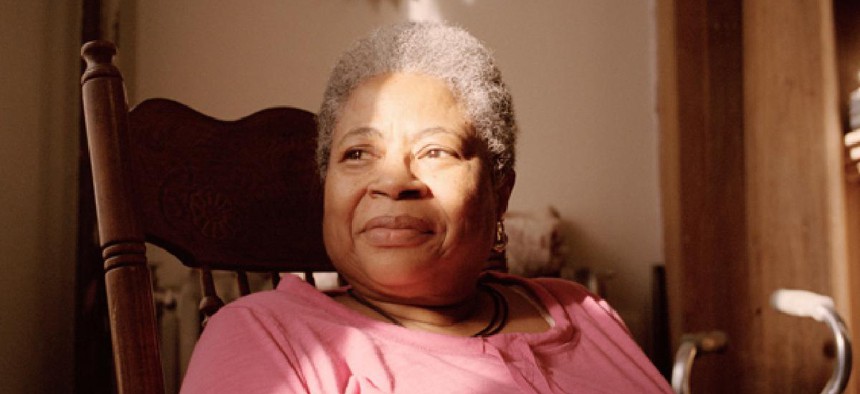SAGE Helps LGBT seniors manage chronic disease

Photo: Jasper Briggs
When Nora-Ann Thompson, 66, learned about a new chronic disease management program at the SAGE (Services and Advocacy for GLBT Elders) center where she regularly participates in activities, in Harlem, she thought she was going to receive the same advice she’s heard before: quit smoking and lose weight.
But Thompson, a retired nurse who suffers from chronic conditions including back problems, obesity, arthritis, diabetes and depression, said she was pleasantly surprised after signing up for the six-week program that ended in January. After implementing new eating habits and other health tips into her daily routine, Thompson, who also attends Zumba, meditation and African dance classes at the SAGE center in Harlem, said she is beginning to see some improvements in her health.
During Thompson’s last doctor’s visit, she learned that her diabetes number has improved slightly, and her blood pressure has been stable.
“This (program) gave you real alternatives, and how to make a plan and follow a plan,” Thompson said.
The Chronic-Disease Self-Management program Thompson attended at SAGE, the largest organization serving the New York City area’s lesbian, gay, bisexual and transgender older adults, was funded with half of a $100,000 grant the nonprofit received in 2015 from the New York Community Trust. The program was part of the organization’s push to make evidence-based health training available to participants in the Harlem, Brooklyn and Bronx locations it has expanded and opened within the last year and a half.
“One of the goals was to have LGBT older people learn to manage their health care,” said Catherine Thurston, chief services officer at the organization. The two six-weekprograms served 33 individuals and were conducted this spring; 75 percent of those who started the program completed it.
Porsha Hall, health and wellness manager at SAGE, said the fact that LGBT seniors experience isolation was one of the main incentives for creating two self-care management programs funded by the 2015 grant: a Chronic Disease Self-Management Program and a Diabetes Self-Management Program.
Thompson said that the chronic disease self-care management program helped her find practical ways to manage a few of her chronic conditions. She learned helpful techniques to deal with anxiety, such as breathing deeply, meditating and using music to relax. To manage her weight, she learned how to make a plan that is “measurable and doable,” such as gradually eliminating nighttime snacks, and to add more vegetables to her meals.
The $100,000 grant was renewed again this year, this time with a focus on providing mental health services. Half of this year’s grant will be used to develop training programs to help SAGE staff manage the growing number of participants with mental illness, Thurston said. As with the previous grant, the other half is being used to fund self-care management programs that SAGE has run on an ongoing basis with previous funding from NYCT.
SAGE, founded in 1978, has a budget of about $10 million for the upcoming fiscal year, and serves about 3,500 registered participants at its five New York City locations. More than 75 percent of the organization’s participants live on fixed incomes.
“We were getting a lot of people who were very severely and persistently mentally ill,” Thurston said, describing the motivation for developing a mental health training program. The organization had experienced a number of incidents which she called “explosive situations.” Thurston said no one was injured, but the organization recognized the need to train staff to safely address similar issues in the future.
As a population that has experienced “a lifetime of being excluded,” many LGBT seniors are dealing with the consequences of having had inconsistent work histories and as a result, poor insurance coverage, said Rachel Pardoe, program officer at the New York Community Trust. “They’re often isolated, and because of the isolation, it creates negative health outcomes.”
SAGE works to help them overcome that isolation, Hall said.
“It’s re-establishing support, but then it’s also teaching people how they can be better support systems for people around them,” Hall said. For many LGBT seniors, who have lost touch with family for a variety of reasons, “your friends often become your support system – they become your family.”